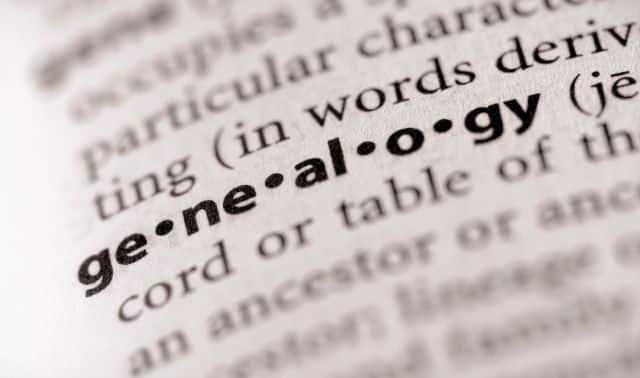By Tony Williams | August 20, 2023
In my journey to becoming a Christian, I did a deep dive into the history of history, especially in Genesis. I did so because I figured that if I could discount the story of our origins, I could discount the whole book. To my surprise, I found that story after story in Genesis and the other historical books of the Old Testament have much to verify their authenticity in terms of archeology and documentary evidence, as well as growing evidence from the field of genetic research. While being hyper-critical of the historicity of the Old Testament is popular, doubts have a way of being undone as archeology and science press on. There is a long and growing list of cities mentioned in the Bible that were thought to be made up by Biblical writers that archeologists continue to dig up.
Noah’s Lineage Provides Evidence for the Past
The writer of Genesis says that Noah had three sons named Ham, Shem, and Japheth, who, with their wives, walked away from the ark and repopulated the world. This may sound like a fairy tale to many in 2023, but if you look at the evidence that actually exists to support that idea, you may be surprised.
If we take the view that the history of Genesis is true, we shouldn’t have to go far to look for clues. The flood would have occurred only about 4,600 years ago. Interestingly, Wikipedia notes: writing developed in places around the world in “Mesopotamia between 3400 and 3100 BCE, Egypt around 3250 BCE, China in 1200 BCE, and lowland areas of Southern Mexico and Guatemala by 500 BCE.” The timing of the development of written language provides its own evidence of a timeline that correlates with the end of the flood, as meticulously outlined in Genesis.
The sons of Noah had a total of 16 sons that are identified in some detail. For some, the generations are continually referred to throughout history; for others, the ending is not as clear. If the so-called Table of Nations in Genesis 10 were true, we would expect to find some memory of these important men if the event occurred only a few thousand years ago.
A Jewish historian named Josephus was taken captive by Rome within a century of Christ’s crucifixion and was made to detail the history of the Jewish people. He did so in the work “Antiquities of the Jews.” With his work, as well as other historical works, we begin to see that humanity expanded in a pattern away from Ararat and across Europe, Africa, and the Middle East. While Josephus certainly would have relied on the Torah and should not be seen as inspired, he also would likely have had access to other resources to form his history of people groups from writers who were much closer witnesses than we are, whose work may have been lost with time.
Lineage of Japheth
According to Genesis, Japheth moved west from the area the ark landed (possibly present-day Turkey) and was said to be the father of sons named Gomer, Magog, Madai, Javan, Tubal, Mechech, and Thiras. Gomer was called by the historian Josephus the founder of the people whom the Greeks at his time called Galls (think Galatians), but in prior times he said they were called Gomerites. Modern Turkey is thought by many to be named after one of Gomer’s sons, who was called Togermah. One of Gomer’s other sons who migrated to modern Germany was named Ashkenaz, which has always been the Hebrew word for Germany (think Ashkenazi Jews).
You probably remember the people group called Galls from history class. They eventually moved into modern France and Spain. It has been recorded by historians that Gomer’s descendants landed as far away as Britain 300 years after the flood and that the original language of the Welsh was called Gomeraeg.
Japheth’s son Madai is said to be the origin of modern-day Iranians. If you recall your history (or your Bible verses), you likely remember the kingdom of the Medes and Persians. The Medes were descendants of Madai, and the Persians were claimed to be the descendants of Shem’s son Elam (think Biblical Elamites). Those two people groups came together in history to become the Mede and Persian kingdoms, which are well identified in secular and Biblical history.
Lineage of Ham
Ham had four sons, and it would seem that his descendants headed primarily into Africa and Southwest Asia. The Bible indicates that Africa is the land of Ham, and some of his offspring are the namesakes of countries still in existence today.
Ham’s son Cush is the Hebrew word for Ethiopia. Another son of Ham is called Mizraim, which was the former name of modern Egypt. When the word Egypt appears in our Bible, it is translated from the Hebrew word Mizraim. Phut is another son of Ham, the namesake for modern Libya. There was also a river there called the Phut River.
In a similar way, one of Ham’s other son’s names is likely familiar to you—Canaan. Canaan is the namesake for the people who settled in what eventually became Israel and Palestine, as described in the Bible and confirmed with much documentary evidence. The Canaanites were a troubled group, and you likely would recognize his sons and grandsons, who included Philistin (Philistines, later the namesake for Palestine), Sidon, Heth (Hittites), Jebus (Jebusites, founder of Jerusalem), the Amorites, the Girgasites, the Hivites, Arkites, Sinbites, and many other people groups identified in the area formerly known as Canaan.
Ham also had a grandson named Nimrod, who was said to be the founder of Nineveh. He is also said to be the builder of the infamous Tower of Babylon. There is still a city in what was called in the Bible Shinar that is named for him. Now, we would call the area Mesopotamia. Interesting how this is considered by historians the “cradle of civilization” and also the place where humanity came together in defiance of God’s order to spread out over the earth.
Lineage of Shem
Shem had five sons-Elam, Asshur, Arphaxad, Lud, and Aram. As discussed above, Elam is the ancient name for Persia (modern Iran). In the time described by Luke in Acts, the Persians present on the day of Pentecost were called Elamites.
Asshur is Hebrew for Assyria, which is a well-known ancient empire. Historians believe that Asshur was worshipped by his ancestors, and all the kings proclaimed that they were given permission to wear the crown by the ghost of Asshur.
Aram is the namesake for the language in which much of the Bible was originally written— Aramaic. They are also referred to as Syrian. The study of the Aramean people and their history shows interaction with many other ancient people groups who have a name rooted with Noah’s grandsons and great-grandsons.
Shem’s son Arphaxad is the grandfather of a man named Eber. Abraham was a direct descendant of Eber, and Eber was the namesake for the Hebrews, as Abraham’s descendants are often called. You may also be familiar with the term anti-Semitic. This term is typically used to describe a disdain for the Jewish people, and the basis of the word Semite is Shem. In a sad twist of history, many people groups in the Middle East who hold openly anti-Semitic views are themselves descendants of Shem, as well.
Totality of Evidence Supports the Biblical Table of Nations
History, whether researched by secular professionals or Bible-believing professionals, is undeniably full of the people groups that are identified in Genesis as originating in the generations of Ham, Shem, and Japheth. Those in the immediate generations after the flood would span out (with the occasional issue of tower building requiring divine intervention) and populate the earth, name cities for themselves, and create a memory that remains today in the form of languages, names of cities and landmarks, names of people groups, and stories of our collective history.
The writing above barely scratches the surface of the total evidence for the true history of Noah’s grandsons. I would encourage you to look at the evidence for yourself to grow your faith in God and His Word. A few resources that I have used to compile this information are listed below.
As I researched this topic many years ago, I gained an appreciation for the fact that history didn’t stop after Noah’s grandsons and great-grandsons established people groups that would form the world’s countries and kingdoms. Those countries and kingdoms are you, me, and every other person who has ever lived, intermingled, and now spread over the whole world. We all share the history that we can trace with documentary history, archeological studies, and now DNA evidence back to Ham, Shem, and Japheth and their wives. This undoes the narrative that people groups are at various stages of evolutionary development, which has prompted much of the racism and bigotry in our world. If we saw ourselves as a common people from a common family, would we treat one another differently?
It is worth remembering that the flood that led to Noah and his sons and daughters-in-law repopulating the world was a judgment against the way men treated each other. The tragedy of Cain and Abel continues to play out every day in our world, even if we are more distantly related than the first brothers.
I believe in the adage that those who forget history are doomed to repeat it. Like the ark, Christ is the only way to avoid the next judgment. When we hurt others, no matter where they are from, they are our people; they belong to God, who made them in His image. If we can stay the course with Christ and ride out the storm with faith in Him and love for our brothers and sisters, we can look forward to a large family reunion in our Father’s kingdom to come with not just our generation but all the faithful of all the generations who got us to where we are today. I hope I will see you there.
About the Author

Tony Williams is currently serving in his 20th year as a police officer in a city in Southern Illinois. He has been studying apologetics in his spare time for two decades, since a crisis of faith led him to the discovery of vast and ever-increasing evidence for his faith. Tony received a bachelor’s degree in University Studies from Southern Illinois University in 2019. His career in law enforcement has provided valuable insight into the concepts of truth, evidence, confession, testimony, cultural competency, morality, and most of all, the compelling need for Christ in the lives of the lost. Tony plans to pursue postgraduate studies in apologetics in the near future to sharpen his understanding of the various facets of Christian apologetics.





